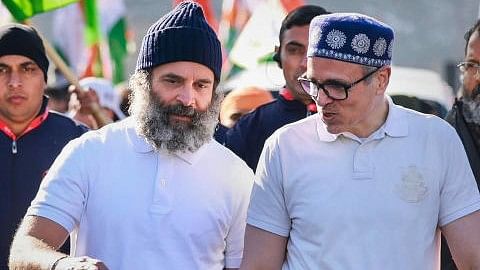
Congress leader Rahul Gandhi with NC's Omar Abdullah
Credit: PTI Photo
The ‘alliance’ between the Congress and the National Conference (NC) for the ongoing elections in Jammu and Kashmir seems to be only on paper. At the end of the two phases of polling the cohesion between the two political parties is missing on the ground.
From the beginning, the alliance was riddled with contradictions. NC leaders, including former chief minister Omar Abdullah, were against any tie-up with the Congress, and, instead, wanted to go alone and was more inclined towards a post-poll alliance. Abdullah had suggested that the two sides replicate the Indian National Developmental Inclusive Alliance (I.N.D.I.A.)’s Punjab formula in J&K so that they do not cede their respective political space to a third political party.
In the 2024 Lok Sabha elections, the Congress and the Aam Aadmi Party (AAP), both I.N.D.I.A. bloc members, fought together in Goa, Haryana, Delhi, and Gujarat, but separately in Punjab.
AAP and Congress leaders from Punjab were of the view that the two sides would enable the Bharatiya Janata Party (BJP) to usurp the main Opposition's space if they joined hands in the border state. The ruling AAP and the main Opposition Congress eventually fought against each other. The Congress won seven out of the 13 Lok seats in Punjab, and AAP bagged three. The Shiromani Akali Dal (SAD) won one seat, while Independents secured two seats.
NC's reluctance
The NC remained non-committal even after Congress president Mallikarjun Kharge and Leader of the Opposition Rahul Gandhi drove down to the Gupkar Road residence of former J&K chief minister Farooq Abdullah on August 22 to meet him and his son Omar Abdullah in their bid to seal the deal.
After some persuasion, the NC leadership proposed that it would leave all 43 seats to the Congress in the Jammu region in lieu of all the 47 seats in the Kashmir valley. The idea was to let the two national parties battle it out in the Hindu-dominated Jammu region while consolidating its position in the Muslim-majority Valley.
Local pressure on Congress leadership
However, some local Congress leaders, mainly from the Valley, were desperate to have a pan-J&K alliance as they were themselves keen to contest the elections.
Accordingly, senior Congress leaders K C Venugopal and Salman Khurshid rushed to Srinagar to convince the NC to go for an alliance. The reluctance of the NC leadership upset Gandhi to such an extent that he asked the party’s J&K unit to prepare the list of candidates in all 90 seats. Kharge and Venugopal, at the behest of the local Congress leaders, managed to calm down Gandhi.
The NC eventually relented and as per the seat-sharing agreement, decided to contest 51 seats, while the Congress fielded its candidates in 32 seats. One seat each was allotted to the CPI(M) and the Jammu and Kashmir National Panthers Party (JKNPP). It was also agreed to have a ‘friendly contest’ in five seats.
The ‘friendly fight’ has since extended to nearly a dozen seats, and the top leaders of the two parties have also started taking digs at each other. The rebels too are proving to be a headache for both the parties, and have the potential to divide the votes.
Options before Congress
The Congress could have also gone with the J&K People's Democratic Party (PDP) which had been sending feelers to the grand old party for a long time. Like the NC, the PDP too is a part of the I.N.D.I.A. bloc.
For their part, Congress leaders were not in favour of any tie-up with the PDP given the growing unpopularity of Mehbooba Mufti's party after its alliance with the BJP in 2015.
Perhaps their understanding was that the people of Kashmir widely hold Mufti and her party responsible for the abrogation of Article 370 and also for downgrading and dividing the state into two union territories.
The desperation shown by the J&K Congress to go for an alliance was surprising given that the grand old party had gained some momentum after Gandhi's successful leg of the Bharat Jodo Yatra, and his growing popularity in the Valley, especially among the youth.
In such a scenario, the best bet for the Congress would have been to go solo, thereby revitalising the workers and strengthening its party organisation across the erstwhile state.
Real test for alliance
The battle in the Jammu belt is mainly between the Congress and the BJP. It is also a real test for the NC to ensure the transfer of votes to the Congress from its areas of influence since its leaders had insisted that the grand old party should focus on the region and deploy all its firepower and resources there. If it fails to do so, the division of votes could help the BJP retain its supremacy in the region.
That said, the forced marriage between the two had shown signs of early discord that might eventually result in its complete breakdown.
(Aurangzeb Naqshbandi is a senior journalist who has been covering the Congress for 15 years, and is currently associated with Pixstory.)
Disclaimer: The views expressed above are the author's own. They do not necessarily reflect the views of DH.
Assembly Elections 2024 | In the first assembly polls since the Lok Sabha elections, Narendra Modi and the BJP face a rejuvenated and vindicated Opposition in the Haryana assembly polls. Meanwhile, Jammu and Kashmir is voting after almost a decade and it remains to be seen how the abrogation of Article 370 has impacted the political landscape of the Valley. Track the latest coverage, live news, in-depth opinions, and analyses only on Deccan Herald.